Channel One's Impact
I was disappointed by "Undue Influence" (Perspectives, Oct. 1998). In her summation of Channel One, Marge Scherer states, "Indeed part of what Channel One sells is youth culture. And the other part is commercial products." That assessment was based on the opinion of a project assistant's eight-year-old memory.
Channel One is a serious news show that is widely respected, but that was not always the case. Started by Christopher Whittle in 1989 as a way to advertise to students, Channel One today is owned by Primedia Communications, which holds the news broadcast to the highest journalistic standards. In their recent analysis of 40 randomly selected broadcasts, Mike Cohen and Boaz Mourad found that "Channel One does an excellent job in providing news coverage, investigative reporting, and important information to students." Comparatively, its substance "surpasses the depth of and scope of most broadcast news and information programming."
Today 40 percent of the nation's secondary schools subscribe to Channel One; eight million students watch it every day. We could not get that kind of response if we were only an advertising vehicle that focused on youth culture.
—Paul D. Folkemer, Executive Vice President for Education, Channel One Network, New York, New York
Editor's reply: For the record, Clare graduated in 1994, not 1990. Her memory of the commercials she was required to view is only four years old.
We welcome comments from readers who have used Channel One in the classroom: Do positive benefits offset the impact of commercials in the classroom?
Struggling with Greed
Henry Giroux, in "Education Incorporated?" (Oct. 1998), eloquently explains how educators struggle with the forces of greed and commercialism. Today, the survival of public education and even of democracy itself is at stake as never before. Giroux points out not only the areas of risk but also the ways in which we can ensure that public schools remain places where children and adults can learn about and practice democratic traditions. I thank him for continuing the good fight to keep the message alive.
—D. Kim Jamieson, Deputy Superintendent, Petaluma City Schools, Petaluma, California
Plague of Commercialism
Henri Giroux's article "Education Incorporated?" (Oct. 1998) well describes the situation in my school. We have been locked in to Channel One for six years. Pepsi donated two scoreboards. And to my surprise, when I picked up a student's personal calender as part of a time-management review, I noticed the Coke logo on the bottom of every page. The plague is spreading with no end in sight.
—Mark Previte, Northern Cambria High School, Barnesboro, Pennsylvania
Curriculum Standards in Wales
While visiting my home country of Wales, I observed the curriculum reforms mentioned by Nicholas Tate, chief executive of England's Qualifications and Curriculum Authority, in his interview with Carol Tell (October 1998). (Although Wales, England, and Scotland are separate countries with separate governing boards and examination committees, the new mandates apply to all.) I was underimpressed and sad to see a school system that was once the envy of the world reduced to hour-long "literacy sessions."
Admittedly, student exams in Great Britain are more demanding than those that our U.S. students take, but the limits placed on students at a very early age would not be welcome here, where the education system has always been available to all. We may envy the academic standards of the European systems, but they come with a high price—exclusivity.
—Avril Font, Hammond, Louisiana
